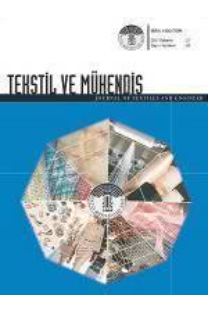TEKSTİL SEKTÖRÜNDE DİJİTAL DÖNÜŞÜM VE TEKSTİL FİRMALARININ ENDÜSTRİ 4.0 KAVRAMSAL FARKINDALIK DÜZEYİNİ BELİRLEMEYE YÖNELİK BİR ÇALIŞMA
DIGITAL TRANSFORMATION IN TEXTILE INDUSTRY AND A STUDY TO DETERMINE THE CONCEPTUAL AWARENESS LEVEL OF TEXTILE FIRMS REGARDING INDUSTRY 4.0
___
- 1. Schumacher, A., Erol, S. and Sihn, W., (2016), A Maturity Model for Assessing Industry 4.0 Readiness and Maturity of Manufacturing Enterprises, Procedia CIRP, 52, 161-166.
- 2. Kamble, S.S., Gunasekaran, A. and Sharma, R., (2018), Analysis of the Driving and Dependence Power of Barriers to Adopt Industry 4.0 in Indian Manufacturing Industry, Computers in Industry, 101, 107-119.
- 3. Rauch, E., Linder, C. and Dallasega, P., (2020), Anthropocentric Perspective of Production Before and Within Industry 4.0, Computers & Industrial Engineering, 139, 1-15.
- 4. Thames, L. and Schaefer, D., (2016), Software-Defined Cloud Manufacturing for Industry 4.0, Procedia CIRP, 52, 12-17.
- 5. Zhou, K., Liu, T. and Zhou, L., (2015), Industry 4.0: Towards Future Industrial Opportunities And Challenges, IEEE 12th International Conference on Fuzzy Systems and Knowledge Discovery (FSKD), August 15-17, Zhangjiajie, China.
- 6. Kagermann, H., Wahlster, W. and Helbig, J., (2013), Recommendations for Implementing the Strategic Initiative Industrie 4.0, Final Report of the Industrie 4.0 Working Group, National Academy of Science and Engineering, Frankfurt.
- 7. Davutoğlu, N.A., (2017), İşletme Yönetiminde Sanayi 4.0 Kavramı ile Farkındalık Oluşturarak Etkin Bir Şekilde Değişimi Sağlamak, Akademik Sosyal Araştırmalar Dergisi, 52(52), 544-567.
- 8. Tekstil Mühendisleri Odası, (2018), Bursa’da Tekstil Günleri 2018 etkinlikleri, Tekstil Endüstrisinde 4.0 Çalıştayı Raporu, Bursa, 6 Aralık, websitesi: https://www.tmo.org.tr/images/editorimages/uploads/tekstilendustrisinde-4.0-calistayi-raporu.pdf., Erişim Tarihi: 09.02.2021.
- 9. Tarakçıoğlu, I. (1989), Türkiye’de Tekstil Teknolojisi Seçiminde Strateji Ne olmalıdır?, Tekstil ve Mühendis, 3(18), 280-286.
- 10. Hermann, M., Pentek, T. and Otto, B., (2016), Design Principles for Industrie 4.0 Scenarios, 49th Hawaii International Conference on System Sciences (HICSS), January 5-8, Koloa, HI, USA.
- 11. Fırat, S.Ü. ve Fırat, O.Z., (2017), Sanayi 4.0 Devrimi Üzerine Karşılaştırmalı Bir İnceleme: Kavramlar, Küresel Gelişmeler ve Türkiye, Toprak İşveren Dergisi, 114, 10-23.
- 12. Acatech – National Academy of Science and Engineering, (2011), Cyber-Physical Systems: Driving Force for Innovation In Mobility, Health, Energy and Production, Springer-Verlag, Berlin, Germany.
- 13. Tosunoğlu, B., (2019), Endüstri 4.0 ile Birlikte Akıllı İmalat Çağı, İçinde: Endüstri 4.0’ın Muhasebe, Denetim ve Finans Dünyasına Yansımaları, 25-40, Gazi Kitabevi, Ankara, Türkiye.
- 14. Rüßmann, M., Lorenz, M., Gerbert, P., Waldner, M., Engel, P., Harnisch, M. and Justus, J., (2015), Industry 4.0: The Future of the Productivity and Growth in Manufacturing Industries, Boston Consulting Group, Inc.15. Görçün, Ö.F., (2018), The Rise of Smart Factories in the Fourth Industrial Revolution and Its Impacts on the Textile Industry, International Journal of Materials, Mechanics and Manufacturing, 6(2), 136-141.
- 16. Gökalp, E., Gökalp, M.O. and Eren, P.E., (2018), Industry 4.0 Revolution in Clothing and Apparel Factories: Apparel 4.0, Peter Lang Publishing, Inc., Berlin, Germany.
- 17. Herrmann, C., Schmidt, C., Kurle, D., Blume, S. and Thiede, S.,(2014), Sustainability in Manufacturing and Factories of the Future, International Journal of Precision Engineering and Manufacturing-Green Technology, 1(4), 283-292.
- 18. Sivamani, S., Kwak, K. and Cho, Y., (2014), A Study on Intelligent User-Centric Logistics Service Model Using Ontology, Journal of Applied Mathematics, 2014(1), 1-10.
- 19. Türkiye Tekstil Sanayii İşverenleri Sendikası, (2017), Türkiye Tekstil Sektörünün Endüstri 4.0 Durum Değerlendirmesi ve Yol Haritası, Mentoro Platformu.
- 20. United Nations Industrial Development Organization (UNIDO), (2017), Accelerating Clean Energy through Industry 4.0: Manufacturing the Next Revolution, Vienna, Austria.
- 21. İlhan, İ., (2019), Tekstil Üretim Süreçleri Açısından Endüstri 4.0 Kavramı, Pamukkale Üniversitesi Mühendislik Bilimleri Dergisi, 25(7), 810-823.
- 22. Doğan, O. ve Baloğlu, N., (2020), Endüstri 4.0 Kavramsal Farkındalık Ölçeği, Karamanoğlu Mehmetbey Üniversitesi Sosyal ve Ekonomik Araştırmalar Dergisi, 22(38), 58-81.
- 23. Adıgüzel, M., (2019), Türkiye Hazır Giyim Sektörünün Sorunları, Çözüm Önerileri ve Rekabet Gücü, İşletme Araştırmaları Dergisi, 11(4), 3485-3504.
- 24. Tekin, H., (1977), Eğitimde Ölçme ve Değerlendirme, 1. Baskı, Mars Matbaası, Ankara, Türkiye.
- ISSN: 1300-7599
- Yayın Aralığı: 4
- Başlangıç: 1987
- Yayıncı: TMMOB Tekstil Mühendisleri Odası
Buğra Artun OLGUN, Fikret Korhan TURAN
Rıza ATAV, Selma SOYSAL, Erkan ÇAĞLAR, Fatma YILDIZ
Buğra Artun OLGUN, Fikret Korhan TURAN
Güzin AKYOL, Eyüphan YENER, Saliha Büşra KARAKELLE
Rıza ATAV, Selma SOYSAL, Erkan ÇAĞLAR, Fatma YILDIZ
Nem Karşısında Yüksek Kararlılığa Sahip Tekstil Tabanlı Sıcaklık Sensörü
